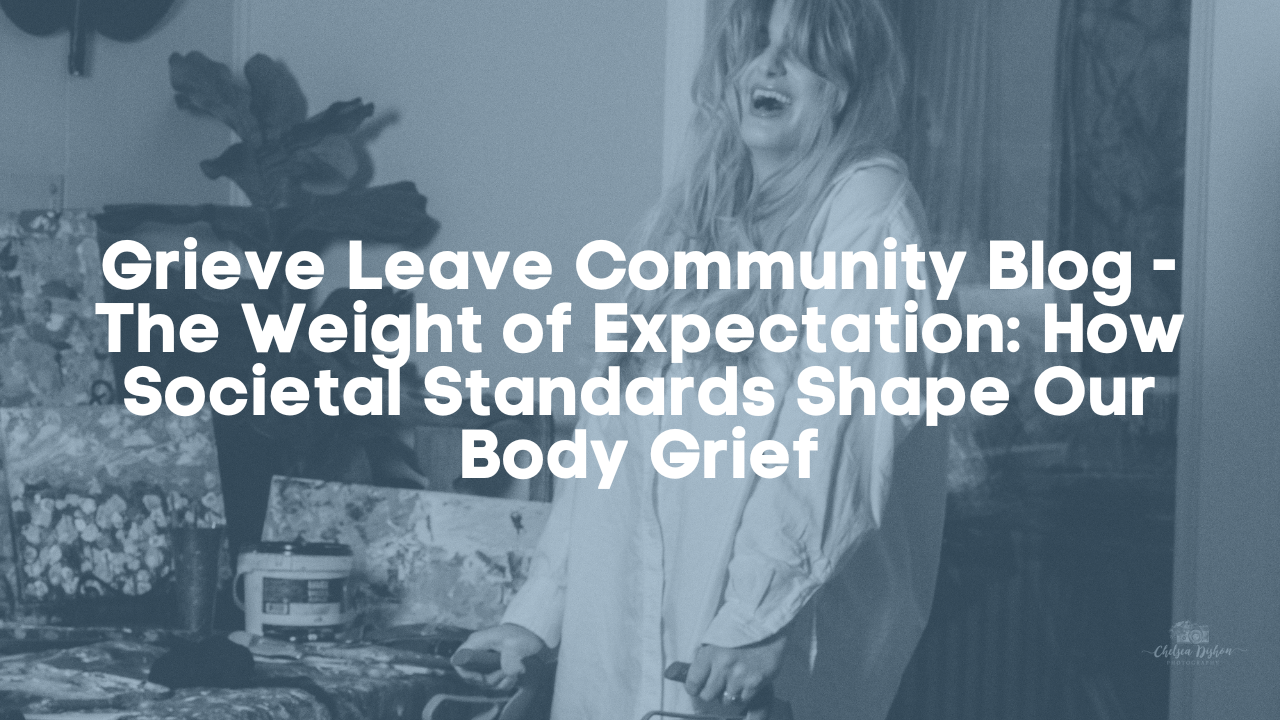Grieve Leave Community Blog: - The Weight of Expectation: How Societal Standards Shape Our Body Grief
Mar 16, 2025
By Jayne Mattingly
There’s a moment—one I imagine most of us have had—where we catch our reflection in a window, a mirror, or a photo we didn’t know was being taken. And in that moment, we see ourselves not as we are, but as we’ve been taught to see ourselves. Our stomachs are too round, our legs too thin, our scars too visible, our posture too hunched. We don’t measure up. We never do.
This isn’t just self-criticism. This is Body Grief.
Body Grief is the quiet (and sometimes not-so-quiet) mourning of what we thought our bodies should be. It’s the sense of loss when we realize our bodies don’t align with the impossible, ever-shifting standards society has shoved down our throats. It’s the exhaustion of trying so hard to meet expectations that were never meant to include us in the first place.
I spent years of my life believing my body was a problem to be fixed. Between working as an eating disorder professional, earning my master’s in clinical mental health counseling, and surviving 19 brain and spine surgeries and a total hysterectomy in just six years, you’d think I would’ve figured it out sooner. But the truth is, no matter how much we know about body image and self-acceptance, none of us are immune to the messages we’ve been fed since birth.
Society loves to make us feel like our bodies are betraying us. We’re told that aging is something to be fought, that weight gain is a personal failure, that disability is something to be pitied, and that health (as defined by an ableist, fatphobic, and racist system) determines our worth. And when our bodies inevitably change—because that’s what bodies do—we feel like we’ve failed. But what if we aren’t the problem? What if we never were?
I’ve learned that our bodies have never been against us. The real betrayal is from a society that teaches us to see our bodies as the enemy. It’s from a culture that makes billions profiting off our insecurities, convincing us that we are broken when in reality, we are just human.
And here’s the thing: our bodies are doing everything they possibly can to keep us alive and find homeostasis. Even when the symptoms of that homeostasis are painful, frustrating, or just plain suck, our bodies are still working in our favor. This idea of Perceived Body Betrayal—the belief that our bodies have turned against us—is a direct result of societal conditioning. But the truth is, our bodies are responding exactly as they need to. It is our job to meet them with compassion, to care for them, and to listen instead of fight.
So how do we grieve something we were never meant to be? How do we unlearn the lies and begin to trust our bodies again?
We start by acknowledging the grief. We hold space for the pain of unmet expectations, for the years we spent believing we were unworthy. And then, we rewrite the narrative. We remind ourselves that our bodies deserve care, not punishment. We find community in the people who see us as we are—not as a project to fix, but as someone already whole. We reject the idea that our worth is tied to how well we conform.
And we choose, every day, to believe the radical truth: Our bodies can always be trusted. They are always on our side.
More on Body Grief
Body Grief and Its Impact on the Human Experience
Body Grief is the emotional pain and mourning that comes from realizing our bodies do not align with societal expectations. It is the grief of unmet ideals, the exhaustion of trying to conform to impossible standards, and the frustration of feeling like our bodies have "failed" us.
This grief manifests in multiple aspects of the human experience:
- Mental and Emotional Well-being – Body Grief fuels self-doubt, shame, and anxiety, making it difficult to embrace self-acceptance. It can contribute to depression, disordered eating, and a fractured sense of identity.
- Physical Health – The stress of body dissatisfaction can lead to chronic tension, fatigue, and self-neglect. People may push their bodies beyond their limits or disengage from self-care entirely.
- Social Relationships – When we internalize negative body narratives, we may isolate ourselves, avoid social situations, or struggle with intimacy and self-worth in relationships.
- Medical and Healthcare Experiences – Body Grief is often exacerbated by medical gaslighting, fatphobia, and ableism in healthcare, making it difficult for people to advocate for themselves and receive proper care.
- Sense of Trust and Safety – Perceived Body Betrayal convinces us that our bodies are against us, when in reality, they are working tirelessly to keep us alive and maintain homeostasis. Learning to offer our bodies compassion—rather than frustration—is essential to healing.
Healing from Body Grief requires unlearning toxic societal conditioning, rewriting the narratives we hold about ourselves, and finding a community that embraces us as we are. It is a lifelong process of cultivating Body Trust and recognizing that we were never broken to begin with.
If this resonates with you, if you’ve ever felt this grief deep in your bones, you are not alone. I wrote This Is Body Grief for you—for all of us navigating the loss of what we thought our bodies should be. It comes out March 18th and is available for pre-order now. Because healing isn’t about fixing ourselves—it’s about finally realizing we were never broken to begin with.
Join the Grieve Leave movement
Share your info to join our Grieve Leave community. You don’t want to miss anything!


